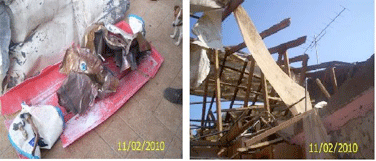By Larry Berger
 The City of Cape Town has finally gazetted a new Property Sales by-law that is now in effect. Just like the Electrical Certificate of Compliance (COC), a Plumbing COC is now needed when a property is being sold.
The City of Cape Town has finally gazetted a new Property Sales by-law that is now in effect. Just like the Electrical Certificate of Compliance (COC), a Plumbing COC is now needed when a property is being sold.1. Cape Town lies in a water-scarce region where, while it is a winter rainfall area, most of the demand is during the summer.
2. The City’s new Water By-Law provided an opportunity for the municipality to be proactive and introduce water conservation and demand management measures to ensure the sustainability of water supply to consumers.
3. The by-law enforces the installation of a hot water cylinder, in accordance with SANS 10254.
The Water By-Law was promulgated on 18 February 2011 and all requirements must be complied with from that date.
What the By-law applies to:
One of the important changes is that a Certificate of Compliance of water installation must now be obtained and submitted to the City upon the transfer of a property to a new owner. This applies to domestic, commercial, and industrial properties, and includes sectional title units.
A plumber who is suitably qualified and accredited in terms of the South African Qualifications Authority must certify that the hot water cylinder complies with SANS 10252 and 10254, that the water meter registers, that there are no water leaks, that water pipes and terminal fittings are correctly fixed in position, that no stormwater is discharged into the sewerage system, and that there is no cross connection between the potable supply and any grey water or groundwater system which may be installed. The conveyancer, on behalf of the seller or owner, needs to submit the signed form to CertificateOfCompliance@capetown.gov.za.
The importance of geyser compliance:
An incorrectly installed geyser led to the roof being blown off in Durban in 2010.

1. Expansion relief not taken to exterior of building.
2. Pressure valve installed upside down. This could result
in valve failure. T and P may open and excessive
expansion relief may occur.
3. Tray has no fall and is existing tray, not new.
4. Water main not secured with brackets. Will cause water hammering,
which may result in pipe or fitting failure. Likely to result in damages claim.
Article reference: Paddocks Press: Volume 7, Issue 10, Page 2
This article is published under the Creative Commons Attribution license.
Recent Posts
Recent Comments
- Graham Paddock on Body Corporate Functions: Insurance
- Graham Paddock on Spending body corporate funds
- Graham Paddock on The Levy Clearance Certificate: The Body Corporate’s Cheap & Effective Weapon
- Graham Paddock on The benefits of online sectional title meetings
- Heinz Wiesner on The benefits of online sectional title meetings
Archives
- July 2024
- June 2024
- May 2024
- April 2024
- March 2024
- February 2024
- January 2024
- December 2023
- November 2023
- October 2023
- September 2023
- August 2023
- July 2023
- June 2023
- May 2023
- April 2023
- March 2023
- February 2023
- January 2023
- December 2022
- November 2022
- October 2022
- September 2022
- August 2022
- July 2022
- June 2022
- May 2022
- April 2022
- March 2022
- February 2022
- January 2022
- December 2021
- November 2021
- October 2021
- September 2021
- August 2021
- July 2021
- June 2021
- May 2021
- April 2021
- March 2021
- February 2021
- January 2021
- December 2020
- November 2020
- October 2020
- September 2020
- August 2020
- July 2020
- June 2020
- May 2020
- April 2020
- March 2020
- February 2020
- January 2020
- December 2019
- November 2019
- October 2019
- September 2019
- August 2019
- July 2019
- June 2019
- May 2019
- April 2019
- March 2019
- February 2019
- January 2019
- December 2018
- November 2018
- October 2018
- September 2018
- August 2018
- July 2018
- June 2018
- May 2018
- April 2018
- March 2018
- February 2018
- January 2018
- December 2017
- November 2017
- October 2017
- September 2017
- August 2017
- July 2017
- June 2017
- May 2017
- April 2017
- March 2017
- February 2017
- January 2017
- December 2016
- November 2016
- October 2016
- September 2016
- August 2016
- July 2016
- June 2016
- May 2016
- April 2016
- March 2016
- February 2016
- January 2016
- December 2015
- November 2015
- October 2015
- September 2015
- August 2015
- July 2015
- June 2015
- May 2015
- April 2015
- March 2015
- February 2015
- January 2015
- December 2014
- November 2014
- October 2014
- September 2014
- August 2014
- July 2014
- June 2014
- May 2014
- April 2014
- March 2014
- February 2014
- January 2014
- December 2013
- November 2013
- October 2013
- September 2013
- August 2013
- July 2013
- June 2013
- May 2013
- April 2013
- March 2013
- February 2013
- January 2013
- December 2012
- November 2012
- October 2012
- September 2012
- August 2012
- July 2012
- June 2012
- May 2012
- April 2012
- March 2012
- February 2012
- January 2012
- December 2011
- November 2011
- October 2011
- September 2011
- August 2011
- July 2011
- June 2011
- May 2011
- April 2011
- March 2011
- February 2011
- January 2011
- December 2010
- November 2010
- October 2010
- September 2010
- August 2010
- July 2010
- June 2010
- May 2010
- April 2010
- March 2010
- February 2010
- January 2010
- December 2009
- November 2009
- October 2009
- September 2009
- August 2009
- July 2009
- June 2009
- March 2009
- February 2009
- February 2008
- February 2007

5 Comments.
Good day.
Can a transfer take place in the Deeds Office or even registration, if the Seller did not issue a Plumbing Certificate of compliance to the transferring attorney. Or is it possible to do the Plumbing Certificate of Compliance after transfer. Thank you.
Dear Peter,
Thank you for your comment. We are more than happy to help, however we do not give free opinions / advice. Please email us on consulting@paddocks.co.za with regards to your matter, and we can provide you with a no-obligation quote, so that we can assist you.
Kind regards,
Paddocks
Please could tell me where I can find the compliance certificate in the sans document. Thanks Lawrence
We have had a plumber inspect our home and we have been presented with a quote for R9000.00
Our geyser has been maintained and has given us no trouble but the new requirement is for the drip tray to have “Fall” and this is going to require the geyser being drained (What a complete waste of prescious water) and the geyser and drip tray have to be raised. I do not see how this exercise is going to do anything to conserve water usage or make the geyser safer than it already is. The geyser was installed before we bought the house eighteen years ago…..???
Hi, how does this affect “New plumbing certificate of compliance” for Cape Town impact on the rest of the provinces? I reside in a sectional title in KzN, do I need to ensure that I have a compliance certificate if I have my geyser replaced?